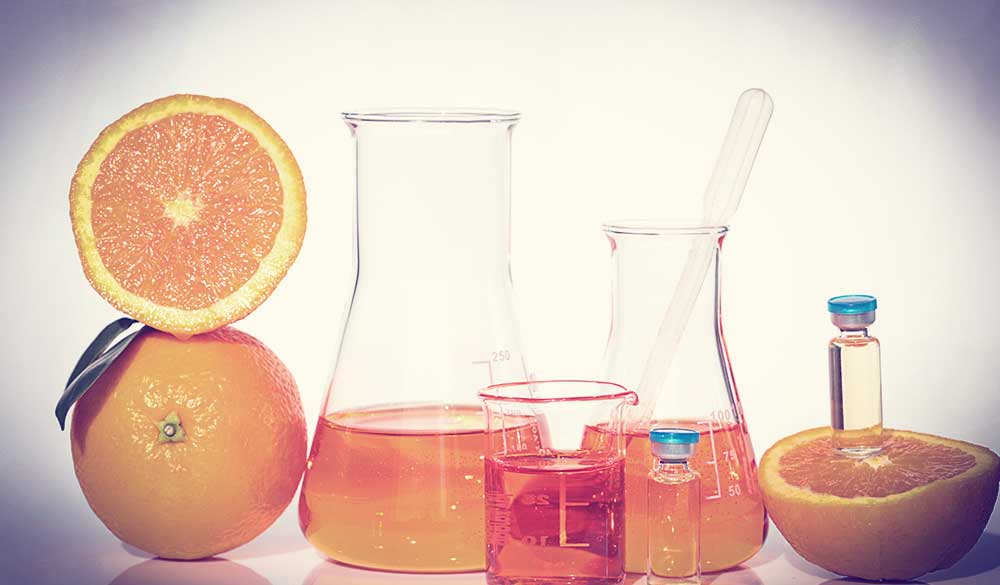Vitamin C (ascorbic acid) is an essential nutrient, considered to be the most important water-soluble antioxidant due to its crucial role in many metabolic functions.[1] Recent research highlights the links between suboptimal levels of vitamin C and elevated risks of chronic diseases.[2] It is increasingly understood that dietary intake and genetics play a role in maintenance of optimal plasma, cellular and tissue vitamin C levels.
Systemic ascorbic acid status is measured by plasma concentrations, with results showing deficiency <11umol/L, marginal deficiency <28umol/L or sufficient >28umol/L.[3] Marginal deficiency is estimated to affect 10% of adults in industrialised countries.[4] Although vitamin C levels are often determined by dietary consumption, impaired status can also be affected by inflammation, stress, recycling and genetic variations.
The major pathway of vitamin C into cells is through sodium-dependent ascorbic acid transports, SLC23A1 and SLC23A2. These two transporters are responsible for nearly all ascorbic acid concentrations in cells, tissues and extracellular fluids.[5] Genetic studies have found single nucleotide polymorphisms (SNPs) of these transport genes indicate increased risk of various cancers, inflammatory bowel disease, cardiovascular disease and optic neuropathy.[1,2]
In a 2018 review, 49 SNPs of SLC23A2 gene were investigated to see if they modify circulating vitamin C levels, with 12 of these showing association to poor vitamin C and diseases states. Carriers of these 12 genetic polymorphisms are summarised in the table below.[1]
|
Gene |
SNP |
Findings |
Reference |
|
SLC23A2 |
rs1279683-GG |
70% elevated risk for primary open angle glaucoma |
|
|
SLC23A2 |
rs12479919-T |
41% elevated risk for gastric cancer |
|
|
SLC23A2 |
rs6116569 |
36% elevated the risk for gastric cancer |
|
|
SLC23A2 |
rs6053005-C |
24% lower plasma ascorbic acid concentrations |
|
|
SLC23A2 |
rs6133175-A |
24% lower plasma ascorbic acid concentrations 60% elevated risk for small lymphocytic lymphoma/chronic lymphocytic leukaemia |
|
|
SLC23A2 |
rs1776948 |
20% elevated the risk for chronic lymphocytic leukaemia |
|
|
SLC23A2 |
rs6139587-T |
Possible association with an aggressive form of lymphocytic leukaemia |
|
|
SLC23A2 |
rs1715364 |
60% elevated risk for small lymphocytic lymphoma/chronic lymphocytic leukaemia |
|
|
SLC23A2 |
rs4987219 |
500% elevated risk of head and neck squamous cell carcinomas when infected with human papillomavirus (HPV) type 16 compared to non-infected individuals (However, this is contrary to other research that could find no association) |
|
|
SLC23A2 |
rs1110277 |
May have elevated risk of developing stomatitis (inflammation of the mouth and lips) during the chemo/radiotherapy for oesophageal squamous cell carcinoma |
|
|
SLC23A2 |
rs1776964 |
3.45 times higher risk of acute coronary syndrome when had high vitamin C intake compared with the CC genotype and low intake |
|
|
SLC23A2 |
rs6139591 |
5.39 times higher risk of acute coronary syndrome with low dietary vitamin C intake |
In Eck’s 2018 review, eight SNPs of SLC23A1 were investigated, with four showing positive association of modifiers of ascorbic acid and increased disease risk. The risks associated with these carrier genes are summarised in the table below.[1]
|
Gene |
SNP |
Findings |
Reference |
|
SLC23A1 |
rs10063949-C |
154% elevated risk for Crohn’s disease |
|
|
SLC23A1 |
rs33972313-A |
Decreased circulating ascorbic acid concentrations |
|
|
SLC23A1 |
rs11950646-GG |
13% lower plasma ascorbic acid concentrations 80% elevated risk for follicular lymphoma (in a US cohort, but no association could be established in a German cohort) |
|
|
SLC23A1 |
rs6596473-CC |
80% elevated risk for follicular lymphoma (in a US cohort, but no association could be established in a German cohort) |
These finding do not indicate certainty. They indicate risk and demonstrate the complexity of gene-nutrient interactions, with associations possibly linking these health conditions with variations in genes affecting vitamin C transporting and concentration.
These findings of disease reinforce the need for further validation studies. Practitioners should consider gene testing when finding clinical presentations of vitamin C deficiency even though the patient has adequate dietary intake.
References
- Eck P. Nutrigenomics of vitamin C absorption and transport. Current Opinion in Food Science 2018;20:100-104. [Source]
- Shaghaghi MA, Kloss O, Eck P. Genetic variation in human vitamin C transporter genes in common complex diseases. Advances in Nutrition 2016;7(2):287-298. [Source]
- Langlois K, Cooper M, Colapinto CK. Vitamin C status of Canadian adults: Findings from the 2012/2013 Canadian Health Measures Survey. Health Rep 2016;27:3-10. [Abstract]
- Chleicher RL, Carroll MD, Ford ES, et al. Serum vitamin C and the prevalence of vitamin C deficiency in the United States: 2003–2004 National Health and Nutrition Examination Survey (NHANES). Am J Clin Nutr 2009;90:1252-1263. [Abstract]
- Lindblad M, Tveden-Nyborg P, Lykkesfeldt J. Regulation of vitamin C homeostasis during deficiency. Nutrients 2013;5:2860-2879. [Abstract]
- Zanon-Moreno V, Asensio-Marquez EM, Ciancotti-Oliver L, et al. Effects of polymorphisms in vitamin E-, vitamin C-, and glutathione peroxidase-related genes on serum biomarkers and associations with glaucoma. Molecular Vision 2013;19:231-242. [Abstract]
- Wright ME, Andreotti G, Lissowska J, et al. Genetic variation in sodium-dependent ascorbic acid transporters and risk of gastric cancer in Poland. European J Cancer 2009;45:1824-1830.[Abstract]
- Duell EJ, Lujan-Barroso L, Llivina C, et al. Vitamin C transporter gene (SLC23A1 and SLC23A2) polymorphisms, plasma vitamin C levels, and gastric cancer risk in the EPIC cohort. Genes and Nutrition 2013;8:549-560.[Abstract]
- Skibola CF, Bracci PM, Halperin E, et al. Polymorphisms in the estrogen receptor 1 and vitamin C and matrix metalloproteinase gene families are associated with susceptibility to lymphoma. PLoS ONE 2008;3.[Abstract]
- Casabonne D, Gracia E, Espinosa A, et al. Fruit and vegetable intake and vitamin C transporter gene (SLC23A2) polymorphisms in chronic lymphocytic leukaemia. Eur J Nutr 2017;56:1123-1133.[Abstract]
- Chen AA, Marsit CJ, Christensen BC, et al. Genetic variation in the vitamin C transporter, SLC23A2, modifies the risk of HPV16-associated head and neck cancer. Carcinogenesis 2009;30:977-981.[Abstract]
- Minegaki T, Kuwahara A, Yamamori M, et al. Genetic polymorphisms in SLC23A2 as predictive biomarkers of severe acute toxicities after treatment with a definitive 5-fluorouracil/cisplatin-based chemoradiotherapy in Japanese patients with esophageal squamous cell carcinoma. Intern J Medical Sciences 2014;11:321-326.[Abstract]
- Wright ME, Andreotti G, Lissowska J, et al. Genetic variation in sodium-dependent ascorbic acid transporters and risk of gastric cancer in Poland. European J Cancer 2009;45:1824-1830.[Abstract]
- Dalgård C, Christiansen L, Vogel U, et al. Variation in the sodium-dependent vitamin C transporter 2 gene is associated with risk of acute coronary syndrome among women. PLoS ONE 2013;8.[Abstract]
- Kobylecki CJ, Afzal S, Smith GD, et al. Genetically high plasma vitamin C, intake of fruit and vegetables, and risk of ischemic heart disease and all-cause mortality: A Mendelian randomization study. AJCN 2015; 101:1135-1143.[Abstract]
- Shaghaghi MA, Bernstein CN, León AS, et al. Polymorphisms in the sodium-dependent ascorbate transporter gene SLC23A1 are associated with susceptibility to Crohn disease. AJCN 2014;99:378-383.[Abstract]
DISCLAIMER:
The information provided on FX Medicine is for educational and informational purposes only. The information provided on this site is not, nor is it intended to be, a substitute for professional advice or care. Please seek the advice of a qualified health care professional in the event something you have read here raises questions or concerns regarding your health.



